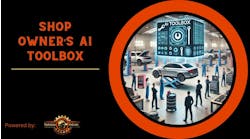Did it ever occur to you that the worse you are at maintaining your equipment, the more your company needs you? Or to say the same thing in reverse: The better you are at your job, the more dispensable you are.
I overheard a group of executives walking by their maintenance manager who at the time was directing his troops to repair a major breakdown. The maintenance manager cast a heroic figure, like George Patton running a major battle.
One executive said to the other: "We're we lucky to have John Doe (maintenance manager)." They all waived to Doe as they passed by.
The common attitude, among most people - and even among maintenance professionals, including those who read Fleet Maintenance - is that the function of maintenance is to repair things that break.
Type of Actions
We need new ways to talk about what we as maintenance professionals provide to our companies.
One new way is to start discussing the idea of intentional maintenance. In every part of the company there is a battle between reactive actions and intentional actions.
There are companies that hope they have enough cash at the end of every month to pay their bills. There are those who plan their cash flow and intentionally take actions to assure adequate cash each month.
There are companies that conduct sales efforts when they have the time and inclination. There are others that intentionally manage their sales effort to provide a steady flow of work.
In maintenance, you can either fix things that break or intentionally act to minimize breakdowns. In fact, you actually have a choice. Either you can schedule your maintenance activity or your machines will.
It could be said that PM, high reliability and effective operator training are all part of a bigger picture of intentional maintenance. That is where the maintenance effort determines its own schedule, and not the breaking down of machines.
Reliability is the outcome of this intentional maintenance environment, and is essential in a safe environment. Repairing the same component is more dangerous in breakdown mode then it is as a planned corrective job.
Risk Factors
Intentional maintenance is really a discussion of risk, risk management and probabilities.
Bad things happen no matter how careful you are. No amount of PM will mitigate a rock breaking a windshield. Random events will occur and cause problems.
The important lesson is the lesson of risk. Intentional maintenance activity reduces the chance of a breakdown or accident.
The difference between 85 percent uptime and 90 percent uptime may not seem like a lot. But with 100 trucks, it is like getting five trucks for free.
It also means fewer late loads, fewer accidents, fewer disruptions to your schedule and the need for fewer standby units.
Looks Easy
But remember, the better you are at intentional maintenance, the easier you make your job appear.
When this happens, you run the risk that when your company executives walk by you, you may hear something like: "John Doe sure has a lot of time for training and mentoring. Did you see the cost reduction project he did on the new lubricants? What a valuable team player. He helps me reach my goals for the division."
I can dream can't I?




